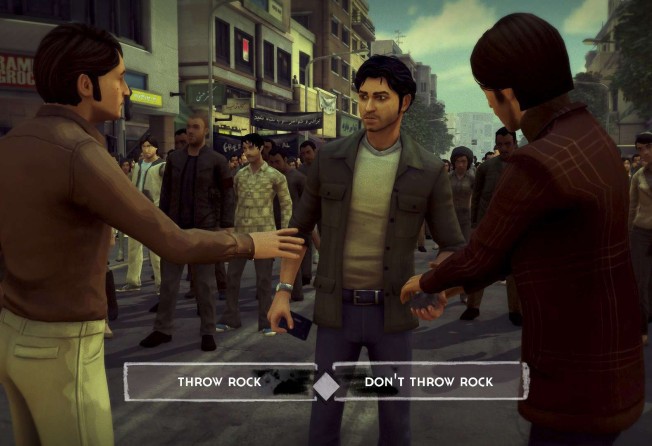
Game review: in 1979 Revolution, you choose the narrative for a much deeper experience
The story of the overthrow of the Shah is told in video game form, where the results are by no means preordained

From the perspective of the present, it can be tempting to view the past as an orderly succession of occurrences. Good history, whatever its form, should remind us that those caught up in the spirit of their times were not predestined to any particular outcome. 1979 Revolution is a sharp new title from iNK Stories, available for PC and OS X, that explores the Iranian revolution as a dynamic entity and not as a settled thing of forgone conclusion. This verité-style game – told with graphic-novel economy – is based on the stories of more than 40 interview subjects whose views of the revolution span different ideological lines.

Reza Shirazi, the game’s young protagonist, doesn’t know where the revolution will take him when he decides to turn his camera on the sea of people flooding the streets of Tehran in the summer of 1978. There, and across the country, workers went on strike to protest falling wages and spiralling economic inequality. Communists, democrats and Islamists were some of the factions and sub-factions that united to protest against the Shah, Mohammad Reza Pahlavi. Locked in their own power struggles, each of these groups saw the revolution as a platform for their agendas.
It’s beyond your ability to shape the direction of the revolution. But you can choose how Reza responds to the incidents to which he’s exposed. No matter your decisions – whether or not you accept some propaganda proffered by the idealists or throw rocks at the jittery-looking soldiers who’ve been ordered to quell discontent – you’ll alienate some of your nearest and dearest. Reza’s father, who sympathises with his son’s political restlessness, makes this point after a curtailed family dinner. Taking Reza into his confidence, he summarises his wife’s disapproval of the ongoing uprising: “But she’s accustomed to a certain way of life – a way of life that people today are protesting.”
The life enjoyed by Mrs Shirazi and her family may surprise those whose knowledge of Iran is bookended by the hostage crisis on one end and the Iranian nuclear deal on the other. In the ’70s, disco and pop culture permeated the air. And in a metropolis such as Tehran, one was as likely to see a woman in bell bottoms as in a chador. In fact, the game makes a point of showing that women held prominent positions in the protest movement and that it is was not at all uncommon for men to defer to their authority.

In a recent interview with some of the game’s developers at their downtown office in Brooklyn, husband and wife Navid and Vassiliki (Bessie) Khonsari, who founded iNK Stories in 2006, explain the idea for 1979 Revolution arose from a talk Navid gave at the School for Ethical Studies on Manhattan’s Upper West Side in 2011.
While much of the outside world was gripped by the evolving story of the Arab spring, he presented the idea for the game and was surprised by the enthusiastic response that it received.
“I always felt that a revolution was an incredible bed for stories and suspense in a game,” Navid says. “Not the traditional game of going around and shooting people but really something that would force you to make choices and also force the people that you are surrounded with to be untrustworthy. Not because of who they are but because of the environment and the situation that had spilt out.”
Bessie elaborates: “To explore the grey zone of people’s perceptions of what has sewn the fabric of history together and really showing the people’s stories. And so, through that, creating an interactive story where you are put in people’s shoes who were forced to navigate this social and ideological landscape, which was also relevant to the time [of the 2011 lecture].”

Since both have worked in documentary films, why, in this case, did they think a game would best serve their historical interests?
“What excited me about making a game is that games have such giant audiences and sweeping outreach that here we had the opportunity to tell a story that mattered with content that is enlightening, but that you could tell it to audiences that weren’t necessarily keen to queue up to this content,” Bessie says.
“The person who is engaging with a game has their own narrative experience and that is the essence of what separates this from a novel,” says Navid. “In this particular experience, you are the protagonist in this world and you get to make choices. Your choices are your narrative. As a result it becomes a much deeper experience.”
The game integrates supplementary materials into its story without overburdening it. Look at some tape vendors on the street, for example, and you’ll see an icon near the bottom of the screen. Click on it and a description of how cassettes were used to spread revolutionary speeches will pop up. Such contextual information can be accessed from the game’s main menu so one needn’t interrupt the story if one doesn’t want to.

Along with games such as Cibele and That Dragon, Cancer, 1979 Revolution sets a new path for games by providing a template for how the medium can tell stories grounded in ordinary life. Some of my favourite episodes in the game were much less spectacular than the incidents one normally sees in games such as the aforementioned family dinner or tending to the wounds of an injured protester.
The Khonsaris tell me that 1979 Revolution has been banned in Iran. Apparently, the responsible treatment of history, even in a game, can be a perilous act.
The Washington Post